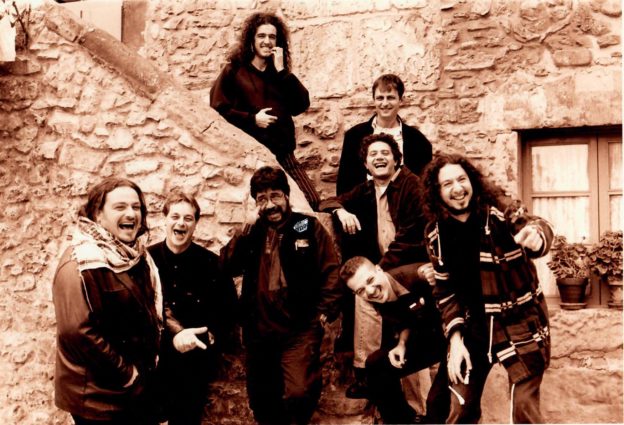
Author Archives: Alberto


Three things I learned from Luís Sepúlveda
Luís Sepúlveda (to his friends “Lucho”, an endearing name for someone called Luís, that also means “I fight” in Spanish) crossed the path of Modena City Ramblers (the band I co-founded) as part of a group of writers, all of them Hispano-Americans: Paco Ignacio Taibo II, Daniél Chavarría, Leonardo Padura, Rolo Díez. This group, that called itself La Banda (The Gang) taught us three things.
The first: it isn’t over until it’s over. In those years (late 1990s), Italy was being normalized: the Clean Hands era had come to an end without the renewal we had been hoping for, and society seemed to have sank into a swamp of immobility. These authors had suffered defeats much more sever than our own (Lucho himself, an opposer to the Chilean dictator Augusto Pinochet, had been tortured in the regime’s prisons; Rolo had been shot in the back, and lived with a bullet lodged near his spine). But they appeared to be immune to the discouragement and negativity that affected us Italian: they just picked themselves up, dusted off, and went right back into the fray, even more enthusiastic than before.
The second: be a team. Beyond the different styles and sensitivities, the components of La Banda leaned on one another, supported each other. The group was a real resource for all its components. Their altruism and team spirit was inspiring. The group to which we naturally belonged, the sort-of-famous, sort-of-alternative Italian rock bands of the time, showed no such spirit. On the contrary, it was often ripples by petty rivalries.
The third: there is much joy in shared work for a meaningful cause. These authors were cheerfull, optimistic, positive people, despite often troubled personal histories: persecution, exile, prison, torture. In 1999, with my band, I traveled to Gijón, in Spain, where Lucho had settled down, to celebrate his 50th birthday. His trajectory would have warmed any heart: from Pinochet’s jails to the safety of Spain, the love of his beloved (she, too, a former prisoner of the Chilean regime), literary and commercial success. Most components of La Banda were there, to celebrate him and the path they all shared. I watched them sit over dinner, exchange funny and terrible memories, call each other “compañero de toda la vida”, bringing a hand to their heart. They expressed strong, sincere feelings, with a wink and a nod to the stereotype of the sentimental South American. And I thought: these are good lives. I, too would like a life like theirs.
These three lessons have stayed with me. They have been a common legacy of the Modena City Ramblers experience, for as long as I stayed in the band. Later, I brought them with me into my current life as a “mutant” social entrepreneur. Fight for a worthy cause, with a group of people you love and admire, and even a small chance of winning: if it not the recipe for happiness, it’s close. Close enough.
Ave atque vale, Lucho. You fought well. I hope that, at the end, people will be able to say the same of us all.
R.I.P. Luís Sepúlveda, 1949-2020

Dating and intimacy in lockdown: some experiments
Someone on this forum expressed a curiosity for how people take care of their intimate life while locked down and quarantined away, unable to freely connect with those we love. As we enter the sixth week of lockdown in Belgium, I think I am ready to share some thoughts and the results of a few experiments I have been making.
Context
I am openly polyamorous. At the time of writing, I am in three stable relationships – hopefully I will keep them for the rest of my life. A possible fourth one was just starting up when SARS-CoV-2 entered our lives. So, even in “normal” times, I spend quite a long time thinking about my love life, and taking care of the safety and happiness of my lovers. I am what’s called a “solo poly”: I do not live with any of my lovers. Rather, I have my own place, which I use as a platform to spend time with them all.
Lockdown is especially hard on poly folks like me. Monogamous people can simply hole in with each other, but this is almost never practical in polyamorous constellations. Choices have to be made; practical choices, for the most part, but often with emotional consequences.
The law and public institutions make little or no provision for polyamorous people. I live in Belgium: recently, a Flemish TV show on how ordinary people live out their quarantine interviewed a member of the polyamorous community. By sheer coincidence, immediately after her, the same program interviewed Marc van Ranst, the epidemiologist leading the committee for national security that determines Belgium’s lockdown measures. The host asked van Ranst if he had polyamorous people in mind when he designed those rules. He replied he has the utmost respect for our choices, but, actually, no, not at all. You can see the whole thing (in Dutch) here.
Making choices: preparing for the confinement period
Maybe because I have family and friends in Italy, I saw the confinement measures coming, and had some time to prepare for them. The first thing I did was consider the situation of my present and possible-near-future-lovers. Here I refer to them with pretend names to protect their privacy.
Two of them, that I will call Jessica and Stéphanie, have nesting partners. For them, the choice of how to spend the quarantine was made.
The other two, whom I will call Monique and Roberta, are solo polys, like me. But unlike me, they do not live in co-housing spaces, but rather in small-ish apartments in small towns.
That made me decide to ask both Monique and Roberta to move in with me before the confinement started. Before I made a move, I spoke or messaged the other two and confirmed they were OK with it. They were, as I knew they would, but forms are important, and I wanted to give them a voice in my process. Next, I called Monique and Roberta, and made them the offer. More concretely, I offered them each their own room. One could stay in my room, the other in the guest room – I had previously cleared with my housemates that I could commandeer the guest room for the duration of the confinement. Me, I would sleep on the office’s couch, or something like that, and occasionally with one of them.
Roberta accepted immediately. More of an extrovert, she feared loneliness and estrangement during the confinement. Monique, hesitated, but ended up saying no. She gave three reasons: she is more of an introvert, more at ease with being alone than most; our relationship is still quite new, so it is more of a big deal to move on in together, even if it is only temporary; and she is working on a thesis, and thought she could take advantage of this period to get most of it written. Roberta moved in just before the quarantine.
Dating someone who lives in the same house
I insisted on giving Roberta her own room. We are now holed up together, making the best of a bad situation, but we are still, and intend to remain, solo polys. Even if we decided to move on in together at some point, SARS-CoV-2 is a really bad reason to do it. So, for now, we decided it is important to keep a sense of autonomy through this period.
We sleep separately, but then “go on dates”. We dress up, light a candle, maybe cook something special, or order in, then proceed to a “your place or mine” kind of discussion. We still manage to make these moments special. On most non-date nights we typically spend time together anyway, but in a more relaxed manner. Roberta is great at this: after an initial phase of calibration, she managed to reassure me that our relationship is going to survive confinement more or less intact, even strengthened (unless this situation lasts for a very long time, which would obviously change the balance).
Virtually dating distant lovers
That leaves me with the problem of caring for my relationships with Monique, Jessica and Stéphanie. Jessica lives in Brussels: I can see her, keeping distance, go for walks with her and so on. It sucks that I cannot touch her, but I can live with it for a short while – also, Jessica and I have been together for many years, our relationships is very solid. But both Monique and Stéphanie are long distance relationships.
I have been able to find two solutions. The first one is a virtual equivalent of a coffee/dinner date. The main trick, I find, is to make a big deal of an otherwise simple communication event. I am not just calling you, honey, this is a date! I insist a bit on it beforehands (“I am so looking forward to tomorrow’s date!” and similar). I go out of my way to show that I am making an effort, because I love them and care deeply about them feeling loved. Rituals and apparently extravagant behavior function – I hope – as tokens of my commitment to them.
So, I try to make these “virtual dates” a nice experience for them. Again, I dress up as if I were going out; adorn the room with candles; and prepare some technology. My setup consists of:
- A MacBook Pro
- An account with a professional conference call service – currently I use Zoom, working to switch to something less evil soon.
- A professional condenser microphone, with a boom. I have an AKG 414 from my music days.
- An audio board to convert the mic signal into digital – I use a Centrance MicPort Pro, but any audio board will do the trick as long as it can supply 48 volt phantom power to the microphone.
- Bluetooth speakers – these are less important, because they only make the experience better for me, but not for them. Any will do.
When the date starts, Monique and Stéphanie see a dressed-up Alberto, in a cosy, candle-lit room. They hear my voice in high fidelity. We have both made time for the call, we are both in private spaces and can devote some quality time to each other. Monique in particular gets this very well: at our first virtual date she showed up in a beautiful short black dress, full make up, jewellery and had lit candle of her own. She had even put on perfume! I don’t think I ever loved her more. Stéph, who (like me) does not even like phone calls, did not go to the same length, but reported she really liked the experience and is happy to continue “dating” like this for the duration of the confinement.
(Future) explorations in cyber-intimacy
Virtual dates were a novelty, and they got us through the first three weeks of lockdown. What else can I do to keep my lovers engaged and interested, and demonstrate my affection? Monique gave me a very nice idea. It turns out she is into ASMR. So, I used standard digital recording software to experiment with whispering sweet nothings into my microphone, in an attempt to create an intimate sonic space. Most ASMR fans do not see it a sexual experience, so that is not cybersex, but rather cyber-intimacy. Which is fine: happy to experiment with anything that might bring us closer. I could in principle have any of them curl up in bed, with me whispering them to sleep.
This would involve the same technical setup as for virtual dates, but on top of that a good noise-cancelling headphones on her side. One issue here is that ASMR is more immersive if you can record sound in stereo: this would require using two microphones, or, failing that, adding a stereo reverb to the mono signal using some kind of virtual effects rack. I have not looked into this yet.
I am not sure I will, though. Cyber-intimacy only goes so far. As confinement continues, video-conferencing fatigue sets in, for them as well as for myself. Also, it seems likely that at least some restrictions will be lifted fairly soon. Music festivals are out of the question, but we might be (more) able to see our lovers.
But what then? Lockdown might be lifted, but this bug is going to be with us for years, possibly many years. The main issue is quantifying risks. I am personally very happy to take a moderate risk to myself to see my lovers. And I can easily verify if they, too are willing to take them (early indications: yes). But there is an ethical problem here: what about the risks accruing to my lovers’ other lovers? And to their lovers? Not to speak of their children, elderly parents etc. If the One Love Networks hypothesis is correct, we have no way to get the consent of all these people. I predict a lot of computing probabilities in the near future.
Everyone should actively assess risks for others, and seek ways to minimize them, not just poly folks. But the bell rings clearer for us, tor two reasons. The first: because were already aware that we bear responsibilities for the well-being of those lovers’ lovers, whom we night know know little, or not at all. We were already protecting the community. The second: because no one – not the government, not epidemiologists – is doing our homework for us. And here’s another prediction: poly people will become more safe to be around than monogamous folks, because we will adopt stricter standards. This has already happened with sexually transmitted diseases, and it will happen again with SARS-COV-2 and its ilk. Buckle up everyone, we have work to do. More on risk assessment in the coming months.